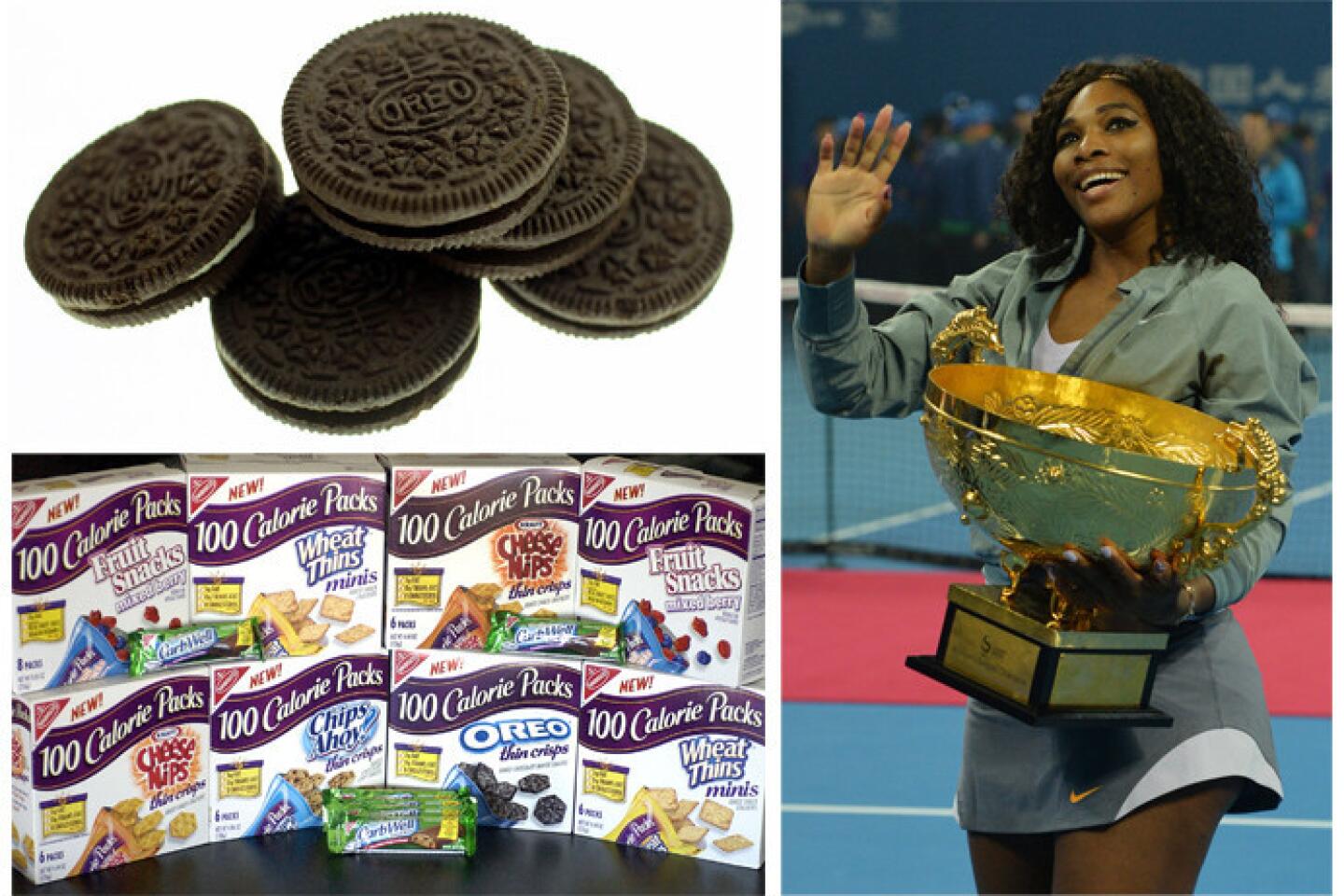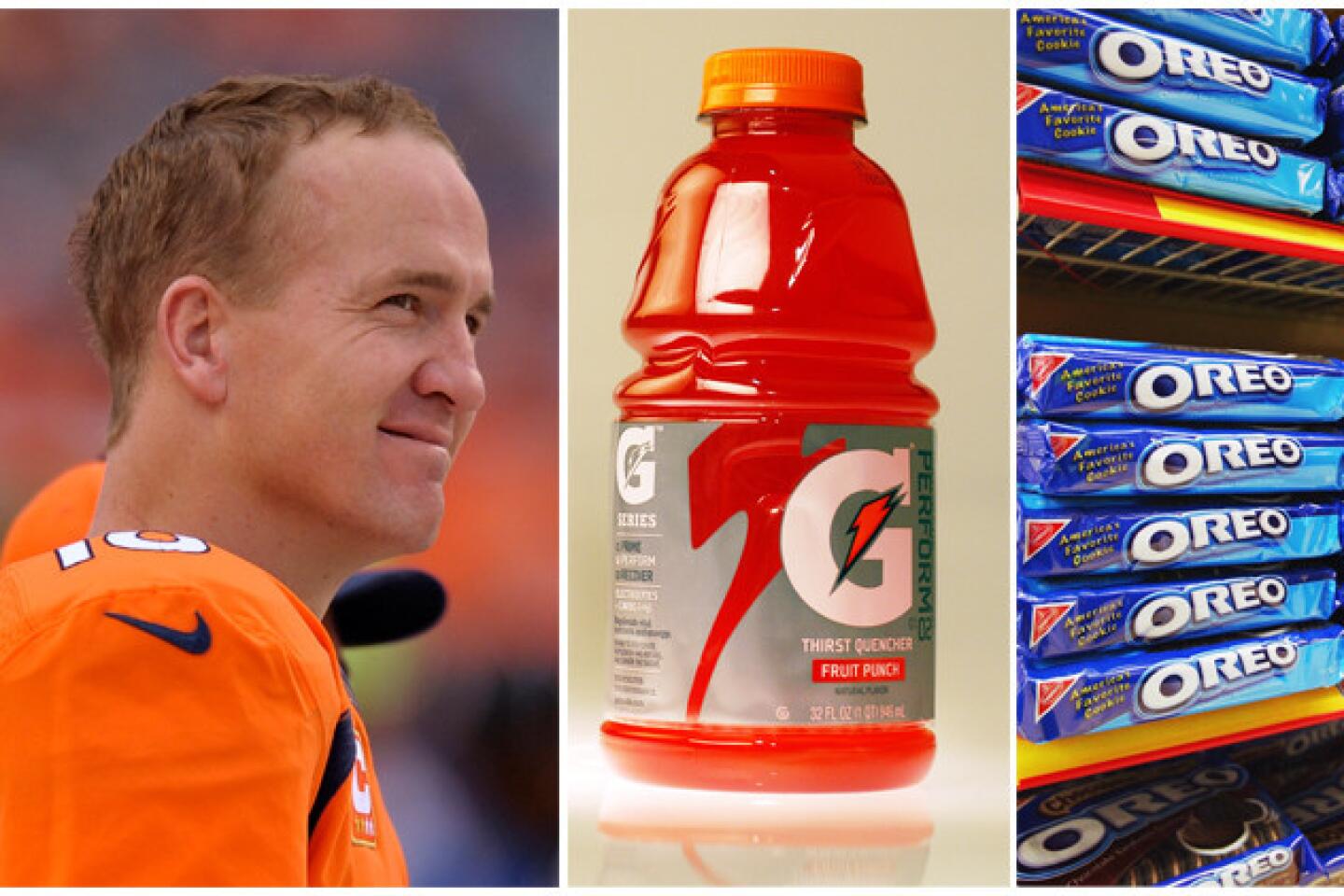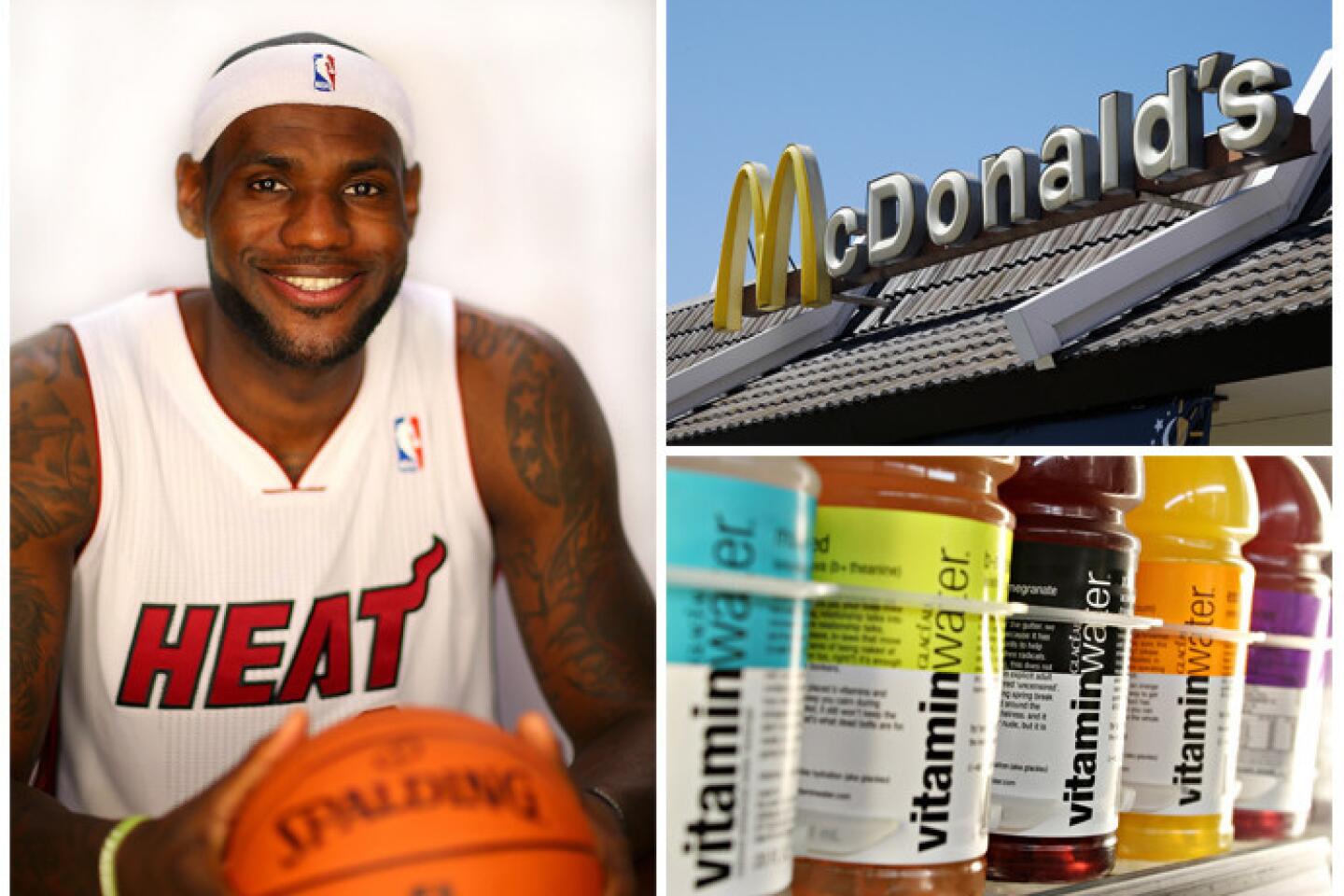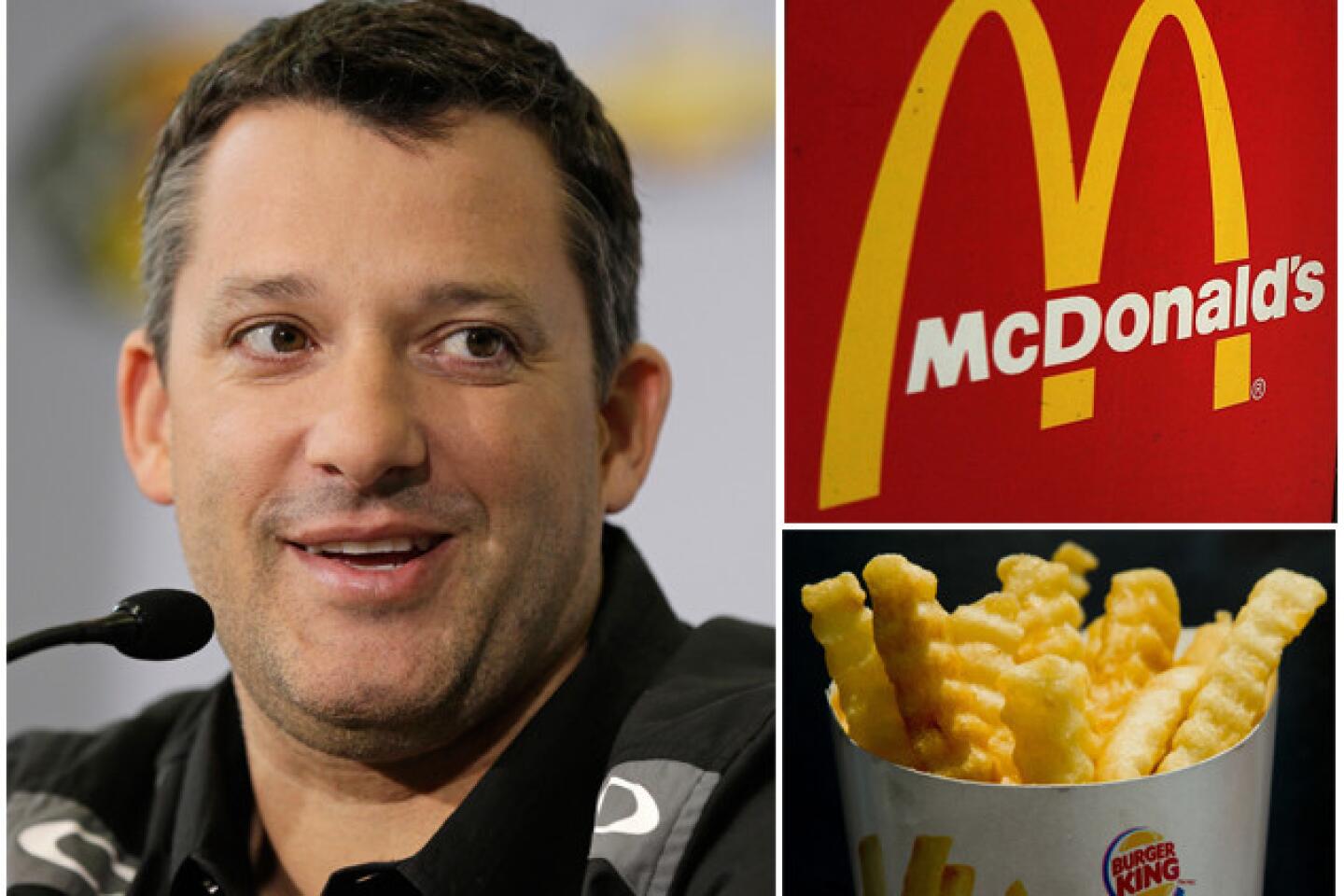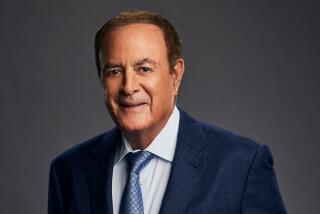Star athletes like LeBron, Serena cash in on junk food endorsements
- Share via
Superstar athletes Peyton Manning, LeBron James and Serena Williams led their colleagues with endorsements of food and beverages that are calorie-dense and unhealthful – sending mixed messages about diet and health, researchers said.
Of 512 brands endorsed by 100 top athletes, nearly a quarter of them (122) were for food and beverages – 44 different brands in 2010, the year studied by researchers from Yale, Stanford, Duke and Harvard universities. (Some brands appeared more than once on the list.)
Nearly 80% of the 49 food products were “energy-dense and nutrient-poor,” and 93% of the 73 beverages got all of their calories from added sugar, according to the study, published Monday in the journal Pediatrics.
The researchers noted “a striking irony of having someone so physically fit as these athletes promoting such unhealthy foods,” lead researcher Marie Bragg of Yale’s Rudd Center for Food Policy and Obesity said in a telephone interview.
And, they said, adolescents ages 12 to 17 were the group that saw the most of such commercials.
“It would be ideal if athletes stopped promoting unhealthful food,” Bragg said. “But that’s a tall order given how much money is involved.” But, she said, she hopes to see such endorsements become a liability for athletes.
Andy Bellatti, a registered dietitian and co-founder of the group Dietitians for Professional Integrity, agreed. “We have to reach that tipping point where advertising for soda is seen as irresponsible,” he said, especially because so many children looked up to sports stars.
Sports beverages were the largest category of athlete endorsements, with 39, followed by soft drinks with 21 and fast food with 16, the researchers wrote. The products in tennis star Serena Williams’ ads had the worst scores for nutrition. Manning had the most ads for food and beverages with 25, followed by baseball player Ryan Howard with 21. Howard, the researchers wrote, endorsed the fewest energy-dense, nutrient-poor products.
Underlying the research is a recommendation from the World Health Organization for policies limiting young people’s exposure to food advertising.
“Professional athletes are in a unique position to use their highly visible status to promote healthy messages to youth,” the researchers wrote.
Efforts to reach the athletes’ spokesmen were not immediately successful.
The American Beverage Assn., a trade group, issued a statement saying, “America’s beverage companies have a longstanding commitment to responsible advertising and marketing practices, including not directing advertising to audiences comprised predominantly of children under 12.”
The statement notes that children under 12 are the not the age group that is “primarily viewing food- and beverage-related advertisements that include professional athletes.”
Football star Manning reportedly earns $10 million a year from contracts with Papa John’s Pizza, Gatorade, Wheaties and other companies that do not sell food, the researchers said. Lakers basketball star Kobe Bryant earned an estimated $12 million a year from his endorsement contract with McDonald’s, they said. James, also a basketball star, was reported to receive $5 million to endorse Bubblicious Gum; one flavor was called LeBron’s Lightning Lemonade.
Such money suggests “how much food and beverage companies value associations with celebrity athletes,” the researchers wrote.
But, they said, future research should “examine how professional athletes’ endorsement of food products affects consumption, attitudes toward food and beverage brands, and intentions to purchase.”
The researchers quantified professional athletes’ endorsements and evaluated the nutritional quality of those foods and drinks, and determined the number of TV commercial exposures of the endorsements and commercials.
They looked at 100 athletes in Bloomberg Businessweek’s Power 100 rankings in 2010. The list ranks athletes according to their endorsement value and prominence. They also used an advertisement database called AdScope, as well as Nielsen ratings.
The researchers watched the ads and collected nutrition information for each food product, then generated scores based on the nutrients in them. (For restaurants, the top five marketed products were used.) Beverages were considered nutrient-poor if all of the calories came from added sugar, healthful if the total was less than 100%.
All of that was used to generate a score to rank athletes. It was that ranking that Manning, Williams and James topped. The researchers found that the National Basketball Assn. had the most athletes who endorsed food, 18, followed by the National Football League with 12, and Major League Baseball with 10.
Public health officials and others have previously criticized professional athletes for endorsing less-than-healthful food. But Bragg said this was the first quantification of the phenomenon.
Last month, the American Beverage Assn. joined with First Lady Michelle Obama and the Partnership for a Healthier America, of which Mrs. Obama serves as honorary chair, to support an initiative encouraging people to drink water.
In a statement about that initiative, the beverage industry group – whose companies include Coca-Cola Co., Dr. Pepper Snapple Group, Nestle Waters North America and PepsiCo – said the industry had long been committed to the health and wellness of Americans.
The Children’s Food and Beverage Advertising Initiative is a volunteer program that many food and beverage companies have joined, vowing to advertise healthful foods on children’s programs. Bragg called that an important step, but some critics have noted that many programs, including sports events, are not children’s programs but are still watched by children, as are the ads placed on them.
The Pediatrics researchers noted that tobacco companies had a history of ads with athletes including baseball legends Babe Ruth, Joe DiMaggio, Ted Williams and Lou Gehrig. They noted that the industry adopted a voluntary advertising code in 1964 not to use athletes.
ALSO:
Cognitive loss is common after a stay in ICU
mary.macvean@latimes.com
